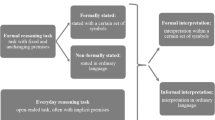Abstract
The study investigated children's and adolescents' perceptions of epistemic authorities in various knowledge domains. Children and adolescents from 4th, 8th, and 12th grades were asked to evaluate their father, mother, teacher, and friends as epistemic authorities in nine areas of knowledge content. In general, the results indicated that the perception of parents as epistemic authorities decreases with age. Nevertheless, children and adolescents continue to consider one or both parents to be the most important epistemic authorities. The perception of friends as epistemic authority increased relative to other sources in the social domains of knowledge. The perception of teachers as epistemic authority decreases with age, but in the formal knowledge domain it remains relatively stable.
Similar content being viewed by others
References
Bar, R. (1983). Authorities hierarchy test. Unpublished masters thesis, Tel Aviv University (in Hebrew).
Bar-Tal, D., and Kruglanski, A. W. (Eds.). (1988).The Social Psychology of Knowledge. Cambridge University Press, Cambridge.
Bar-Tal, D., and Saxe, L. (1990). Acquisition of political knowledge: A social psychological analysis. In Ichilov, O. (ed.),Political Socialization, Citizenship Education, and Democracy. Teachers College Press, New York.
Bar-Tal, D., Raviv, A., Raviv, A., and Brosh, M. (1988). Perception of epistemic authority and attribution for this choice as a function of knowledge area and age. Unpublished manuscript. Tel Aviv University, Tel-Aviv.
Bengtson, V. L. (1975). Generation and family effects in value socialization.Am. Sociol. Rev. 40: 358–371.
Berndt, T. J. (1979). Developmental changes in conformity to peers and parents.Develop. Psychol. 15: 608–616.
Bowerman, C. E., and Kinch, Y. W. (1959). Changes in family and peer orientation of children between the fourth and tenth grades.Social Forces 37: 206–211.
Brittain, C. V. (1963). Adolescent choice and parent-peer cross-pressures.Am. Sociol. Rev. 28: 385–391.
Brody, G. H., and Shaffer, D. R. (1982). Contributions of parents and peers to children's moral socialization.Develop. Rev. 2: 31–75.
Bronfenbrenner, U. (1967). Response to pressure from peers versus adults among Soviet and American school children.Int. J. Psychol. 2: 199–207.
Campbell, J. D. (1964). Peer relations in childhood. In Hoffman, M. L., and Hoffman, L. W. (eds.),Review of Child Development Research. Russell Sage Foundation, New York.
Coleman, J. S. (1961).The Adolescent Society. Free Press, New York.
Damon, W. (1977).The Social World of the Child. Jossey-Bass, San Francisco.
Devereux, E. G., Shouval, R., Bronfenbrenner, V., Rodgers, R. R., Kav-Venaki, S., Kiely, E., and Karson, E. (1974). Socialization practices of parents, teachers, and peers in Israel: The Kibbutz versus the city.Child Develop. 45: 269–281.
Erikson, E. H. (1950).Childhood and Society. Norton, New York.
Floyd, H. H., Jr., South, D. R. (1972). Dilemma of youth: The choice of parents or peers as a frame of reference for behavior.J. Marriage Family 34: 627–634.
Freud, A. (1965).Normality and Pathology in Childhood: Assessments of Development. International Universities Press, New York.
Hartup, W. W. (1983). Peer relations. In Mussen, P. H. (ed.),Handbook of Child Psychology (4th ed., Vol. 4). John Wiley & Sons, New York.
Hunter, F. T. (1985). Adolescents' perception of discussions with parents and friends.Develop. Psychol. 21: 433–440.
Hyman, H. N. (1959).Political Socialization. Free Press, Glencoe, IL.
Inhelder, B., and Piaget, J. (1958).The Growth of Logical Thinking from Childhood to Adolescence. Basic Books, New York.
Kagan, J. (1958). The concept of identification.Psychol. Rev. 65: 296–305.
Kassin, S. M. (1981). From laychild to “layman”: Developmental causal attribution. In Brehm, S. S., Kassin, S. M., and Gibbons, F. X. (eds.),Developmental Social Psychology. Oxford University Press, New York.
Kruglanski, A. W. (1980). The field of cognitive social psychology: Cognitive pluralism and irrationalism reconsidered. Paper presented at the Symposium on New Developments in Attribution Theory.
Kutnick, P. (1980). The conception of school authority: The socialization of the primary school child.Genet. Psychol. Monogr. 101: 35–70.
Lambert, B. G., Rotschild, B. F., Atland, R., and Green, L. B. (1972).Adolescence: Transition from Childhood to Maturity. Brooks/Cole, Monterey, CA.
Livesley, W., and Bromley, D. (1973).Person Perception in Childhood and Adolescence. Wiley, London.
Middleton, R., and Putney, S. (1963). Political expression of adolescent rebellion.Am. J. Sociol. 68: 527–537.
Piaget, J. (1970). Piaget's theory. In Mussen, P. (ed.),Carmichael's Manual of Child Psychology (3rd ed., Vol. 1). Wiley, New York.
Raviv, A., Bar-Tal, D., Raviv, A., and Houminer, D. (1990). Development in children's perceptions of epistemic authorities.British Journal of Developmental Psychology, 8, 157–169.
Salmon, P. (1979). The role of the peer group. In Coleman, J. C. (ed.),The School Years. Methuen, London.
Schantz, C. U. (1983). Social cognition. In Mussen, P. H. (ed.),Handbook of Child Psychology (4th ed., Vol. 3). John Wiley, New York.
Sebald, H. (1986). Adolescents' shifting orientation toward parents and peers: A curvilinear trend over recent decades.J. Marriage Family 48: 5–13.
Siman, M. L. (1977). Application of a new model of peer group influence to naturally existing adolescent friendship groups.Child Develop. 48: 270–274.
Smith, L. M., and Kleine, P. F. (1966). The adolescent and his society.Rev. Educat. Res. 36: 424–436.
Solomon, D. (1961). Adolescents' decisions: A comparison of influence from parents with that from other sources.J. Marriage Family 23: 393–395.
Staton, T. F. (1963).Dynamics of Adolescent Adjustment. Macmillan, New York.
Utech, D. A., and Hoving, K. L. (1968). Parents and peers as competing influences in the decisions of children of differing ages.J. Social Psychol. 78: 267–274.
Wintre, M. G., Hicks, R., McVey, G., and Fox, J. (1988). Age and sex differences in choice of consultant for various types of problems.Child Develop. 59: 1046–1055.
Author information
Authors and Affiliations
Additional information
Received Ph.D. in clinical psychology from the Hebrew University in Jerusalem. Research interests concern media psychology, knowledge formation, and school psychology. Requests for reprints should be sent to Amiram Raviv at Department of Psychology, Tel Aviv University, Tel Aviv, Israel 69978.
Received Ph.D. in psychology from University of Pittsburgh. Research interests concern political psychology, social psychology of knowledge, and stereotyping.
Received Ph.D. in statistics from the Hebrew University in Jerusalem. Research interests concern nonparametric statistics and applied statistics.
Received M.A. degree in clinical child psychology from Tel Aviv University.
Rights and permissions
About this article
Cite this article
Raviv, A., Bar-Tal, D., Raviv, A. et al. Perception of epistemic authorities by children and adolescents. J Youth Adolescence 19, 495–510 (1990). https://doi.org/10.1007/BF01537477
Received:
Accepted:
Issue Date:
DOI: https://doi.org/10.1007/BF01537477




